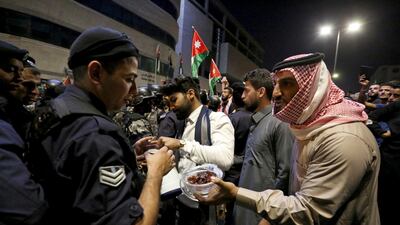Omar Al Razzaz, the man appointed to head Jordan's new government, faces the difficult task of implementing urgent economic reforms while placating a public strongly opposed to further austerity measures.
The stakes are high. While the government faces a $750 million deficit and demands from the International Monetary Fund to reduce its debt to GDP ratio (currently over 95 per cent), Jordan is wracked by the largest protests seen in the kingdom since 2011, which continued Monday evening even after the resignation of former Prime Minister Hani Mulki.
King Abdullah II officially appointed Al Razzaz to form a new government on Tuesday and immediately tasked him with obtaining a national consensus on the controversial income tax law that sparked the upheaval.
The bill, which was introduced last Thursday, would broaden the individual tax base and increase business tax. Reforms earlier saw the prices of everyday items – from hummus to fuel – increased significantly, but they passed with little more than grumbling on social media. With businesses and vendors facing an unusually quiet Ramadan, Thursday's tax bill prompted Jordanians to protest in huge numbers.
_________
Read more
Few easy options for Jordan's incoming prime minister
Jordan's king freezes planned price increases
_________
Dr Al Razzaz's background as a former World Bank economist suggests he will maintain the government's reform agenda. Before heading the education ministry in the outgoing government, Dr Al Razzaz obtained a PhD and a postdoctorate degree from Harvard University, held an assistant professorship at the prestigious Massachusetts Institute of Technology and served as the World Bank's country manager in Lebanon. He has authored numerous academic papers and chairs several boards in Jordan.
Dr Razzaz is also credited with excellent communication skills and an ability to reach out to different constituents, skills that will be as essential as his academic credentials if he is to sell a vision of economic reform to Jordan's disaffected youth, of whom more than 30 per cent are unemployed.
"He is liberal, open-minded, a good listener and democratic," said Imad Hmoud, an independent business analyst based in Amman. "But he will face a difficult task. He thinks outside the box but, without a carte blanche, it will be difficult for him to adopt economic reforms. The entire economic system is based on collecting taxes. We need sound economic reforms at this point."
In an address appointing Dr Al Razzaz, King Abdullah advised the government to overhaul the tax system and to seek to defuse rising tensions and address public grievances over austerity. Analysts suggest this will be a tall order for the incoming prime minister, pointing to the fact that the resignation of Prime Minister Mulki was just one of the protesters' demands.
"It is a cosmetic change and will not have a big impact," said Amer Sabaileh, a political analyst and director of Middle East Media and Political Studies Institute, a think tank with a branch in Amman.
"The reaction to the protests by changing the prime minister and the government does not match actions," he continued. "There is an accumulation of mistakes, from the structure of the governments that are not elected to the misguided policies that have negatively impacts the economy."
Mr Sabaileh likened the government shake-up to treating a serious illness with a mild painkiller. "The street has mobilised due to pent-up grievances, this requires major solutions," he said. "The public is fed up with the government policies. If public grievances are not addressed, the protests may go out of hand."
With the potentially fatal consequences of failing to placate protesters evident in the ongoing civil war over the border in Syria, King Abdullah has sounded a warning to Jordan's government: perform or else.
"We must acknowledge that there has been underperformance, laxness and hesitance in decision-making," he told editors of the country's papers on Monday. "This has been addressed and officials and governments were dismissed."
The King expressed displeasure at being forced to step into the country's politics, according to a transcript of his comments posted to his website.
“This is not my role,” he said. “My role is to be the guarantor of the constitution and the balance of powers. Each power, and each official, have to be up to the responsibility. Those who cannot deliver should leave their positions to those who can.”

